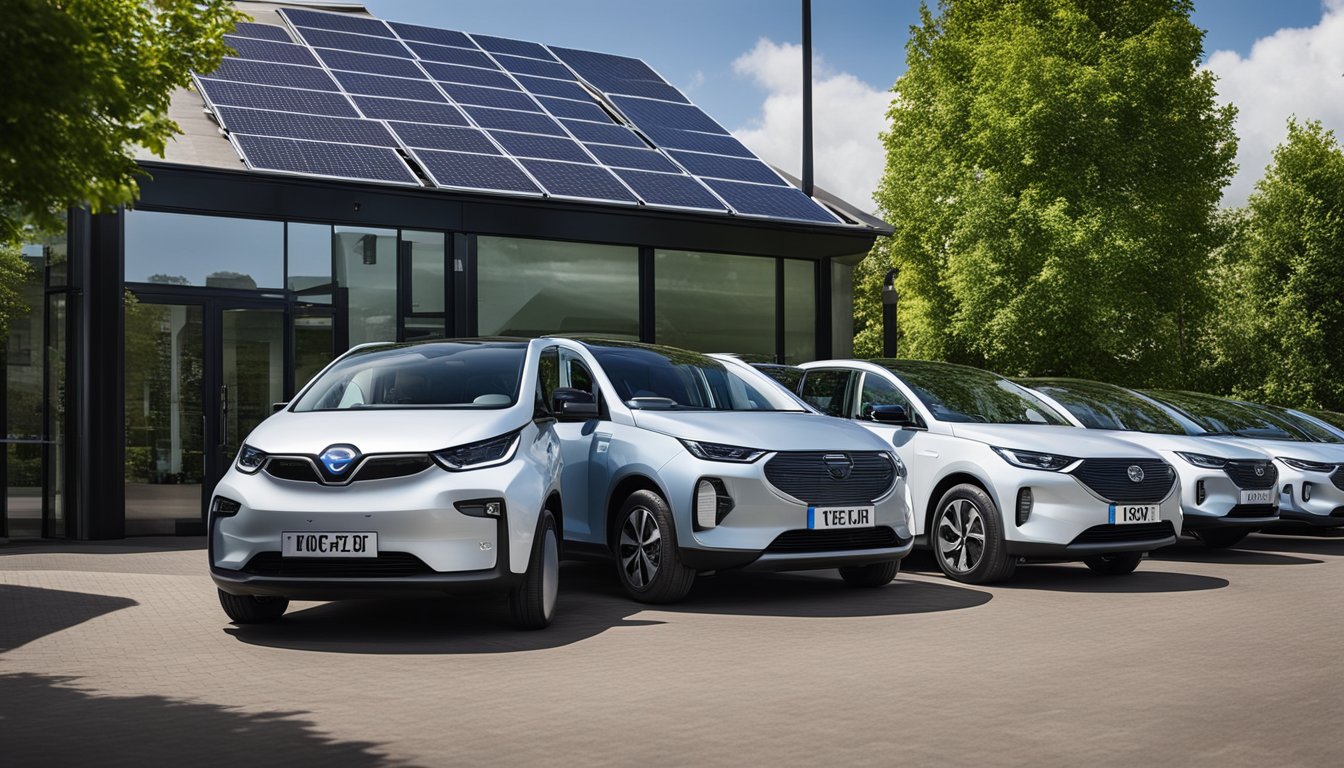Late updated: 24 Oct 2024 10:10
Written by: Amber Collins
Sustainable Fleet Management Strategies For UK Businesses: Enhancing Efficiency and Reducing Costs
Managing a fleet sustainably is no longer just about reducing emissions; it's an essential strategy for future-proofing UK businesses amid increasing environmental regulations and customer expectations. As climate change continues to impact our planet, our approach to fleet management must adapt, embracing innovative technologies and practices to reduce carbon footprints significantly. By combining machine learning, artificial intelligence, and data-driven insights, businesses can transform their fleet operations into exemplars of sustainability.

The transition to greener fleets offers substantial benefits beyond environmental impact. Companies adopting sustainable fleet management strategies gain a competitive edge, driving operational efficiency and cost savings. From electric vehicles to optimised logistics, these changes not only contribute to healthier ecosystems but also enhance the bottom line by reducing fuel and maintenance costs.
Emphasising sustainability within fleet management aligns with broader corporate social responsibility goals. It positions companies as leaders in an era where consumers and stakeholders are increasingly motivated by environmental impact. This dual focus on ecological responsibility and economic viability ensures that our fleets set the standard for sustainability in the UK transportation sector.
Key Takeaways
- Sustainable fleet management reduces emissions and operational costs.
- Embracing technology enables efficient and eco-friendly fleet operations.
- Green fleets align businesses with consumer values and regulatory demands.
Strategies for Sustainable Fleet Operations

As we work towards more sustainable fleet management, adopting environmentally friendly vehicles, harnessing advanced telematics, and improving route planning are essential. Each of these strategies contributes to increased fuel efficiency and reduced emissions.
Adoption of Electric and Alternative-Fuel Vehicles
Switching to electric vehicles (EVs) and those powered by alternative fuels like hydrogen and natural gas is pivotal. This transition can significantly cut greenhouse gas emissions and improve air quality. In addition, EVs often have lower running costs due to their efficient use of energy resources.
Incentives and grants from the UK government make it financially viable for businesses to upgrade their fleet. Moreover, using alternative fuels further diversifies energy sources, enhancing sustainability. By prioritising EVs and alternative fuels, we align our strategy with eco-friendly goals and drive significant environmental and economic benefits.
Implementing Advanced Telematics Systems
Advanced telematics systems, which incorporate GPS tracking and real-time data analytics, are vital tools in fleet management. By monitoring vehicles, these systems provide valuable actionable insights into factors like fuel consumption and maintenance needs.
Telematics enables precise route optimisation, leading to improved fuel efficiency and reduced wear-and-tear on vehicles. Additionally, by tracking and analysing driver behaviour, we can promote safer and more efficient driving practices. Investing in telematics not only boosts fleet efficiency but also supports our sustainability strategies by reducing unnecessary emissions.
Optimising Routes and Driver Behaviour
Effective route optimisation is crucial in enhancing fleet operations. Through data-driven decision-making, we can plan the most efficient routes, saving time and reducing fuel use. This decreases overall emissions, aligning with our sustainability goals.
Training drivers on better driving habits helps in achieving even greater fuel efficiency. By focusing on eco-friendly driving practices, we can cut down fuel costs and minimise the fleet's environmental footprint. Together, these strategies enhance performance while adhering to environmental standards, paving the way for a cleaner, more sustainable future.
Environmental and Economic Impacts

In the pursuit of a sustainable future, our focus extends beyond reducing carbon emissions to also realising economic benefits through improved operational efficiency. By understanding the dual impacts, we can move towards responsible fleet sustainability that aligns with corporate responsibility and customer perception.
Reducing Carbon Emissions and Footprint
We recognise that achieving sustainability goals requires a dedicated effort in reducing our carbon footprint. Adopting low-emission vehicles is a key step, as it directly contributes to zero tailpipe emissions. By transitioning to electric and hybrid models, we not only lower carbon emissions but also work towards net zero targets.
Moreover, implementing data analytics plays a crucial role. By analysing vehicle usage and optimising routes, we can significantly cut down fuel consumption. These strategies contribute to building a green fleet, enhancing our corporate image, and meeting customer expectations for environmentally responsible practices. Adopting innovative technologies enables us to make significant strides in reducing overall environmental impacts.
Realising Cost Savings Through Sustainable Practices
Sustainable practices not only bolster our environmental credentials but also lead to considerable cost savings. Energy-efficient vehicles typically incur lower maintenance costs and fuel expenses. Over time, these financial savings augment operational efficiency, making our fleets economically sustainable.
Integrating telematics systems helps optimise fuel consumption and minimise idle times, further reducing expenses. Besides, government incentives often support such eco-friendly transitions, providing financial assistance for adopting sustainable technologies. These combined efforts ensure that our fleets not only align with our sustainability goals but also enhance our long-term viability. By focusing on both environmental and economic impacts, we uphold our corporate responsibility and strengthen our market position.
Frequently Asked Questions

Addressing carbon emissions, embracing telematics, and adopting electric vehicles are vital for sustainable fleet management. Optimised routes and green driving policies further enhance efficiency and eco-friendliness. UK businesses can benefit from several incentives when transitioning to sustainable practices.
What are the best practices for reducing carbon emissions in a business vehicle fleet?
To reduce emissions, our fleet management should focus on regular maintenance and using fuel-efficient vehicles. Encouraging driving behaviours that minimise fuel use, like reducing idling, is also crucial. Incorporating hybrid or electric vehicles into the fleet is another effective way to cut down on emissions.
How can telematics be used to improve the sustainability of company vehicles?
Telematics systems help by monitoring vehicle health and driver behaviour. This data aids in reducing fuel consumption and emissions through optimised driving patterns. We can also use telematics for efficient route planning, thus lowering unnecessary mileage and fuel usage.
What are the benefits of transitioning to electric vehicles for company fleets?
Switching to electric vehicles reduces our fleet's carbon footprint significantly. Besides environmental advantages, electric vehicles often have lower operational and maintenance costs compared to traditional vehicles. They can also enhance our company's image as environmentally responsible, which may attract eco-conscious customers.
In what ways can route optimisation contribute to sustainable fleet management?
Route optimisation minimises travel distance and time, thereby cutting down fuel usage. By avoiding congested routes, we can improve delivery times and reduce emissions. Advanced software solutions allow us to continuously adjust routes for maximum efficiency.
How does implementing a green driving policy influence fleet sustainability?
Green driving policies encourage practices like smooth acceleration and speed regulation to reduce fuel consumption. Training our drivers in these eco-friendly techniques can significantly lower emissions. A well-devised policy not only supports environmental goals but can also lead to cost savings on fuel.
What incentives are available to UK businesses looking to adopt eco-friendly vehicles?
The UK government offers several incentives, such as grants for purchasing electric vehicles and financial benefits through reduced vehicle taxes. These incentives make it easier for businesses to transition to greener fleets, helping us reduce upfront costs and achieve sustainability targets.
